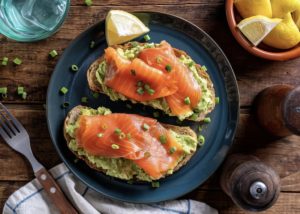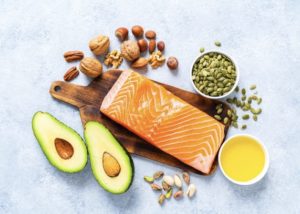- Home
- /
- Vitamins etc.
- /
- Macronutrients
- /
- Fats and healthy eating
- /
- Fats and Healthy Eating
In a world often dominated by discussions of low-fat diets and fat-phobia, it’s crucial to demystify the complex world of fats and their connection with Healthy eating. Contrary to popular belief, not all fats are detrimental to our health. In fact, fats play essential roles in our bodies, contributing to energy storage, hormone production, and cellular function. This comprehensive guide aims to unravel the intricacies of fats, shedding light on their different types, functions, and impact on our overall well-being. By exploring the science behind saturated fats, monounsaturated fats, polyunsaturated fats, and even the notorious trans fats, we will uncover their true significance. Armed with this knowledge, you will be equipped to make informed dietary choices, embracing the right types of fats to support your health goals. So, let’s embark on a journey into the world of fats, where we’ll challenge misconceptions and discover the remarkable benefits they offer.
What are Fats in Healthy Eating?
Fats, are a group of organic compositions that are insoluble in water but soluble in organic thinners. Structurally, fats consist of glycerol and fatty acids, which are long chains of carbon atoms coupled to hydrogen atoms. Fats serve as a source of energy and perform essential functions in our bodies.
Debunking Fat Myths and Healthy eating
There are several common myths surrounding fats that need to be debunked to make dietary choices.
All fats are unhealthy
Firstly, the myth that “all fats are unhealthy” is misleading. Not all fats are made up equal, and there are healthy ones that are crucial for our bodies.
Without fat is better
Secondly, the belief that “fat-free is always the better option” is not entirely accurate. Some low-fat products may be highly processed and loaded with added sugars or unhealthy additives to swap the lack of fat. It’s important to read labels and focus on whole, nutrient-rich foods.
Myth about saturated fats
Lastly, the idea that “all saturated fats should be avoided” is overly simplistic. While it’s well to limit intake, some sources of saturated fats, such as those from lean meats and organic dairy products, can be unit of a healthy diet when taken in moderation. The key is to emphasise the overall dietary pattern and prioritise healthy fats while considering portion sizes and overall caloric intake.
The Types of Fats
There are several types of fats, each with its own unique characteristics and effects on health.
Saturated Fats: Exploring the Good and the Bad
Saturated fats have long been criticized for their potential negative effects on health, but recent research has provided a more nuanced understanding of their impact. While excessive consumption of saturated fats may highten cholesterol levels and boost the heart disease risk, it is essencial to highlight that not all saturated fats are equal.
The source and overall quality of the food containing saturated fats play a significant role. For example, coconut oil, which contains a high proportion of saturated fats, also provides medium-chain triglycerides (MCTs) that have been associated with potential health advantages. Furthermore, incorporating saturated fats from whole food sources, such as lean meats, dairy products, and nuts, as part of a balanced diet, can be enjoyed in moderation without significant adverse effects on health. It is the overall dietary pattern and the quality of fats consumed that should be considered when assessing their impact on our well-being.
Monounsaturated Fats: The Heart-Healthy Fats
Monounsaturated fats, often hailed as heart-healthy fats, have gained recognition for their positive impact on health. These fats are predominantly found in foods such as avocados, oils, and nuts. What sets monounsaturated fats apart is their ability to raise levels of high-density lipoprotein (HDL) cholesterol, customary known as the “good” cholesterol, while decreasing levels of low-density lipoprotein (LDL) cholesterol, often mentioned to as the “bad” cholesterol. This balance is crucial for maintaining cardiovascular health.
Additionally, monounsaturated fats offer antioxidant and anti-inflammatory properties, promoting overall well-being. Including these fats in the diet has been connected with lessen risk of heart disease, improved insulin sensitivity, and better weight management. However, moderation is still key, as monounsaturated fats are calorie-dense. Incorporating them as piece of a well-balanced diet can contribute to a healthier lifestyle and support optimal health outcomes.
Polyunsaturated Fats: Omega-3 and Omega-6 Fatty Acids
Polyunsaturated fats are crucial fats that our bodies cannot produce on their own, making them essential to obtain through diet. These fats are characterised by their multiple double connections in their fatty acid structure. Two forms of polyunsaturated fats, omega-3 and omega-6 fatty acids, have gained significant attention by virtue of their health benefits.
Omega-3 fatty acids, found in fatty fish, flaxseeds, and walnuts, are well- known for their anti-inflammatory properties, cardiovascular benefits, and potential beneficial effect on brain health.
On the other hand, omega-6 fatty acids, present in vegetable oils and seeds, are important for normal growth and development, but excessive consumption relative to omega-3s may promote inflammation. Achieving the proper balance between omega-3 and omega-6 fatty acids is vital for overall health. Incorporating a variety of food sources rich in polyunsaturated fats can help optimise the balance and reap the benefits associated with these essential fats.
Trans Fats: The Unhealthy Culprits
These fats, also famous as trans fatty acids, are a type of unsaturated fat that undergoes a process called hydrogenation, which transforms liquid oils into solid fats. Trans fats have been strongly linked to excessive danger of heart disease, as they raise levels of LDL cholesterol while concurrently decreasing HDL cholesterol. These fats are originally found in processed and fried foods, baked goods, and margarine. That is why it is worth to know for instance the smoke point of some oils.
The Smoke points of some oils are shown here: Smoke point of some oils
Because of their destroying effects on health, many countries have introduced regulations to reduce or obviate trans fats from food products. In recent years, there has been a significant reduction in the consumption of trans fats in many parts of the world. However, it is important to remain vigilant and read food labels carefully to avoid hidden sources of trans fats. Opting for healthier alternatives and cooking methods can help minimise the intake of these unhealthy fats and support cardiovascular health.
The Functions of Fats in Healthy Eating
Fats serve a wide range of crucial functions within the body.
Source of energy
One of their primary roles is energy storage and release. Fat is a highly concentrated source of energy, producing more than twice the calories per gram in comparison with carbohydrates or protein. During times of caloric deficit, the body relies on stored fat for energy, helping to maintain metabolic function.
Fats are crucial in cell membranes, contributing to their integrity and fluidity.
Fats play a vital role in supporting the most favourable brain health and function. The brain is composed of nearly 60% fat, making dietary fats an essential component for its well-being. Omega-3 fatty acids, found abundantly in fatty fish, flaxseeds, and walnuts, are particularly critical for brain health. These fats contribute to the structure and integrity of brain cells, aid in the transmission of nerve signals, and have been associated with enhanced cognitive function and mitigated risk of neurodegenerative diseases. Additionally, fats are involved in the synthesis and maintenance of myelin, a protective sheath around nerve fibers that advance connection between brain cells. Including a variety of healthy fats in our diet can support brain health, enhance memory and cognition, and promote overall mental well-being. Embracing fats as allies for brain health can help us unlock our cognitive potential and thrive in all aspects of life.
Absorption of vitamins
Furthermore, fats facilitate the absorption of fat-soluble vitamins (A, D, E, and K) by forming micelles that aid in their transport across the intestinal lining.
These vitamins require the presence of dietary fats for optimal absorption and utilisation by the body. Without sufficient fat intake, the absorption of these vitamins can be compromised, leading to potential deficiencies.
Vitamin A is essential for vision, immune function, and cell growth, D – for bone health, immune function, and hormone regulation, K is necessary for blood clotting and bone health, E – an antioxidant, protecting cells from damage.
The presence of dietary fats facilitates the transport of these vitamins from the digestive system into the bloodstream, ensuring their availability for various bodily functions. By incorporating healthy fats into our nutrition, we optimise the absorption and utilisation of these essential fat-soluble vitamins, promoting general health.
Hormone production
Hormone production and regulation also rely on fats, as certain hormones, such as sex hormones and adrenal hormones, are synthesised from cholesterol.
Animal-based fats are important in the production and regulation of sex hormones in the body. Sex hormones such as estrogen, progesterone, and testosterone, are derived from cholesterol, a type of fat. These hormones are vital for reproductive health, fertility, and overall hormonal balance. Animal-based fats provide a rich source of cholesterol, which serves as a precursor for the synthesis of sex hormones. Adequate intake of animal-based fats helps support optimal hormone production and regulation.
It is important to note that moderation is key, as excessive consumption of saturated fats, usually discovered in animal-based fats, may have unfavourable effects on cardiovascular health. Choosing lean cuts of meat, incorporating fount of healthy fats including fatty fish, and balancing fat intake with other nutrient-dense foods are essential strategies to reap the benefits of animal-based fats while supporting overall health. Consultation with a healthcare professional or registered dietitian can provide personalised guidance on achieving a balanced and hormone-supportive diet.
Insulation and protection
Lastly, fats provide insulation and protection, helping to cushion vital organs and maintain body temperature. Understanding these diverse functions underscores the importance of incorporating healthy fats into our diet for optimal physiological functioning.
The Dietary Recommendations and Health Implications
Dietary recommendations regarding fat intake have evolved over the years as research has shed light on their impact on health. Current guidelines suggest that fat should contribute around 20-35% of total daily caloric intake, with a focus on consuming predominantly unsaturated fats.
Limiting the consumption of saturated and trans fats is crucial for maintaining cardiovascular health and reducing the risk of heart disease. High intake of saturated fats has been associated with elevated LDL cholesterol levels, while trans fats have been shown to have even more detrimental effects on cholesterol profiles.
Conversely, replacing saturated and trans fats with healthier options like monounsaturated and polyunsaturated fats has been linked to improved lipid profiles and reduced cardiovascular risk.
However, it is important to note that total caloric intake and overall dietary patterns should be considered alongside fat consumption for comprehensive health management. Striving for a balanced diet that includes a variety of nutrient-dense foods will provide the best foundation for overall well-being.
The Sources of Healthy Fats
Incorporating healthy fats into our diet can be achieved by including a variety of nutritious food sources.
Plant-based sources of healthy fats include avocados, olives, nuts, and seeds. Avocados, in particular, are rich in monounsaturated fats, while nuts and seeds provide a mix of monounsaturated and polyunsaturated fats, along with essential nutrients and fiber. Olive oil, especially extra virgin olive oil, is another excellent source of monounsaturated fats and has been associated with numerous health benefits.
On the other hand, animal-based sources of healthy fats include fatty fish like salmon, mackerel, and sardines, which are abundant in omega-3 fatty acids. Other animal-based options include lean cuts of poultry and grass-fed meats, which provide a good balance of saturated and unsaturated fats. When choosing cooking oils, options like olive oil, canola oil, and avocado oil are preferable due to their higher content of monounsaturated fats. Incorporating these sources of healthy fats into our meals can not only enhance the flavour and texture of dishes but also contribute to a well-rounded and nourishing diet.
Striking a Balance of fats for healthy eating
Finding a balance in fat intake is essential for maintaining optimal health. While fats are important for various bodily functions, it’s crucial to consume them in moderation. Strive for a balanced diet that includes a mix of healthy fats from both plant and animal sources, while also considering portion control. Be mindful of your overall caloric intake and balance it with physical activity to avoid excessive weight gain. Additionally, focus on the quality of fats consumed by choosing sources that are prosperous in monounsaturated and polyunsaturated fats while limiting saturated and trans fats. Remember that a diverse and balanced diet, combined with an active lifestyle, is key to overall well-being.
Conclusion
In conclusion, fats play a vital role in our bodies, and understanding their types, functions, and impact on health is essencial for making dietary choices. While saturated and trans fats should be limited, incorporating healthy fats from products like avocados, nuts, fatty fish, and olive oil can provide numerous benefits. Striking a balance is key, considering portion control, overall caloric intake, and the quality of fats consumed. Debunking common fat myths helps us embrace a more nuanced approach to fats in our diet. By adopting a well-informed and balanced approach, we can optimize our health, support cardiovascular function, regulate hormones, and promote overall well-being. Remember, it’s not about completely avoiding fats, but rather choosing the right types of fats and incorporating them in moderation as part of a diverse and nutrient-rich diet.
































































0 Comments